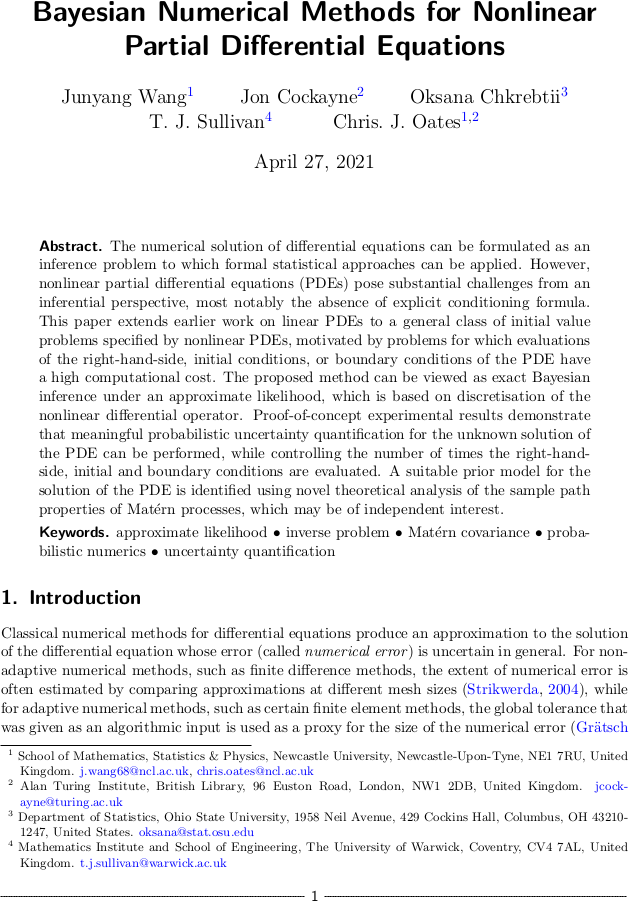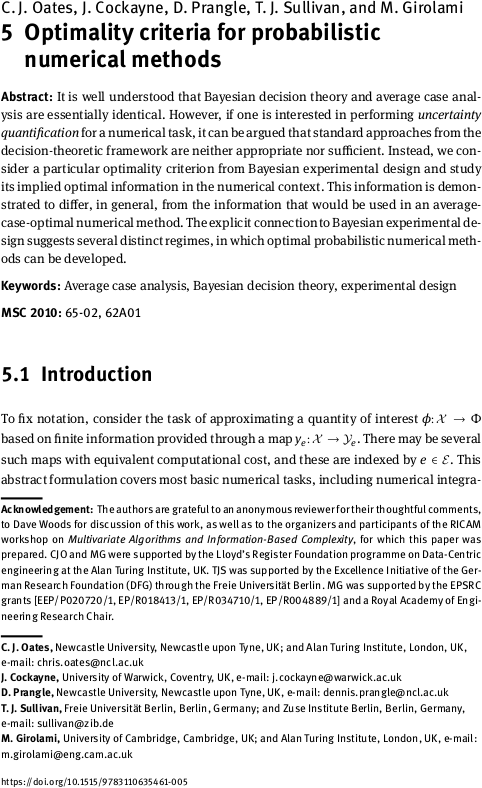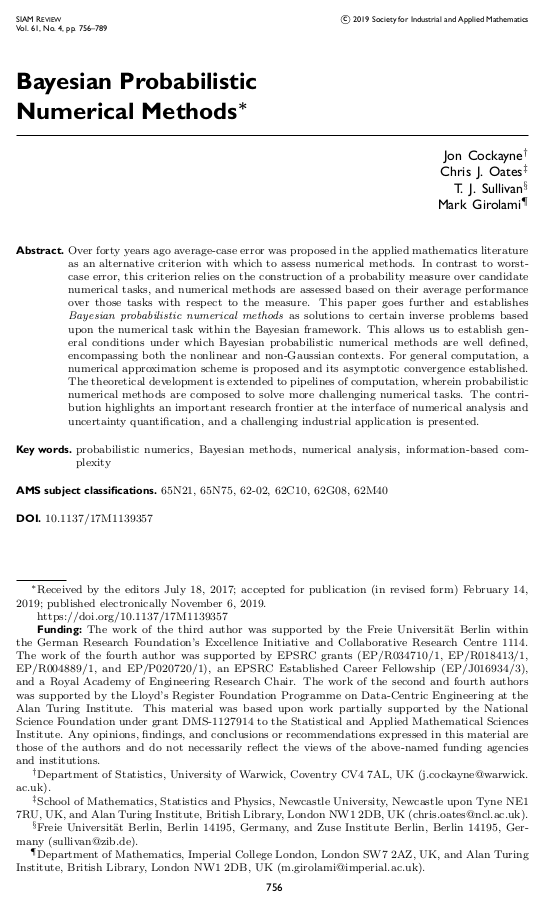#oates

Testing whether a learning procedure is calibrated in JMLR
The article “Testing whether a learning procedure is calibrated” by Jon Cockayne, Matthew Graham, Chris Oates, Onur Teymur, and myself has just appeared in its final form in the Journal of Machine Learning Research. This article is part of our research on the theoretical foundations of probabilistic numerics and uncertainty quantification, as we seek to explore what it means for the uncertainty associated to a computational result to be “well calibrated”.
J. Cockayne, M. M. Graham, C. J. Oates, T. J. Sullivan, and O. Teymur. “Testing whether a learning procedure is calibrated.” Journal of Machine Learning Research 23(203):1–36, 2022.
Abstract. A learning procedure takes as input a dataset and performs inference for the parameters \(\theta\) of a model that is assumed to have given rise to the dataset. Here we consider learning procedures whose output is a probability distribution, representing uncertainty about \(\theta\) after seeing the dataset. Bayesian inference is a prime example of such a procedure, but one can also construct other learning procedures that return distributional output. This paper studies conditions for a learning procedure to be considered calibrated, in the sense that the true data-generating parameters are plausible as samples from its distributional output. A learning procedure whose inferences and predictions are systematically over- or under-confident will fail to be calibrated. On the other hand, a learning procedure that is calibrated need not be statistically efficient. A hypothesis-testing framework is developed in order to assess, using simulation, whether a learning procedure is calibrated. Several vignettes are presented to illustrate different aspects of the framework.
Published on Friday 5 August 2022 at 14:50 UTC #publication #jmlr #prob-num #cockayne #graham #oates #teymur

Bayesian numerical methods for nonlinear PDEs
Junyang Wang, Jon Cockayne, Oksana Chkrebtii, Chris Oates, and I have just uploaded a preprint of our recent work “Bayesian numerical methods for nonlinear partial differential equations” to the arXiv. This paper continues our study of (approximate) Bayesian probabilistic numerical methods (Cockayne et al., 2019), in this case for the challenging setting of nonlinear PDEs, with the goal of realising a posterior distribution over the solution of the PDE that carries a meaningful expression of uncertainty about the solution's true value given the discretisation error that has been incurred.
Abstract. The numerical solution of differential equations can be formulated as an inference problem to which formal statistical approaches can be applied. However, nonlinear partial differential equations (PDEs) pose substantial challenges from an inferential perspective, most notably the absence of explicit conditioning formula. This paper extends earlier work on linear PDEs to a general class of initial value problems specified by nonlinear PDEs, motivated by problems for which evaluations of the right-hand-side, initial conditions, or boundary conditions of the PDE have a high computational cost. The proposed method can be viewed as exact Bayesian inference under an approximate likelihood, which is based on discretisation of the nonlinear differential operator. Proof-of-concept experimental results demonstrate that meaningful probabilistic uncertainty quantification for the unknown solution of the PDE can be performed, while controlling the number of times the right-hand-side, initial and boundary conditions are evaluated. A suitable prior model for the solution of the PDE is identified using novel theoretical analysis of the sample path properties of Matérn processes, which may be of independent interest.
Published on Tuesday 27 April 2021 at 10:00 UTC #preprint #prob-num #wang #cockayne #chkrebtii #oates

Optimality of probabilistic numerical methods
The paper “Optimality criteria for probabilistic numerical methods” by Chris Oates, Jon Cockayne, Dennis Prangle, Mark Girolami, and myself has just appeared in print:
C. J. Oates, J. Cockayne, D. Prangle, T. J. Sullivan, and M. Girolami. “Optimality criteria for probabilistic numerical methods” in Multivariate Algorithms and Information-Based Complexity, ed. F. J. Hickernell and P. Kritzer. Radon Series on Computational and Applied Mathematics 27:65–88, 2020.
Abstract. It is well understood that Bayesian decision theory and average case analysis are essentially identical. However, if one is interested in performing uncertainty quantification for a numerical task, it can be argued that standard approaches from the decision-theoretic framework are neither appropriate nor sufficient. Instead, we consider a particular optimality criterion from Bayesian experimental design and study its implied optimal information in the numerical context. This information is demonstrated to differ, in general, from the information that would be used in an average-case-optimal numerical method. The explicit connection to Bayesian experimental design suggests several distinct regimes, in which optimal probabilistic numerical methods can be developed.
Published on Sunday 31 May 2020 at 08:00 UTC #publication #prob-num #oates #cockayne #prangle #girolami
Online Probabilistic Numerics Minisymposia
Like many international conferences, the SIAM Conference on Uncertainty Quantification planned for 24–27 March 2020 had to be postponed indefinitely in view of the Covid-19 pandemic. Undeterred by this, the speakers of four minisymposia on the theme of Probabilistic Numerical Methods have generously taken the time to adapt their talks for a new medium and record them for general distribution. The talks can be found at http://probabilistic-numerics.org/meetings/SIAMUQ2020/.
We hope that these talks will be of general interest. Furthermore, the speakers have declared themselves ready to answer questions in written form. If you would like to ask any questions or contribute to the discussion, then please submit your question via this form by 10 May 2020.
Organised jointly by Alex Diaz, Alex Geßner, Philipp Hennig, Toni Karvonen, Chris Oates, and myself
Published on Friday 24 April 2020 at 10:00 UTC #event #siam #prob-num #diaz #gessner #hennig #karvonen #oates

Bayesian probabilistic numerical methods in SIAM Review
The 2019 Q4 issue of SIAM Review will carry an article by Jon Cockayne, Chris Oates, Mark Girolami, and myself on the Bayesian formulation of probabilistic numerical methods, i.e. the interpretation of deterministic numerical tasks such as quadrature and the solution of ordinary and partial differential equations as (Bayesian) statistical inference tasks.
J. Cockayne, C. J. Oates, T. J. Sullivan, and M. Girolami. “Bayesian probabilistic numerical methods.” SIAM Review 61(4):756–789, 2019.
Abstract. Over forty years ago average-case error was proposed in the applied mathematics literature as an alternative criterion with which to assess numerical methods. In contrast to worst-case error, this criterion relies on the construction of a probability measure over candidate numerical tasks, and numerical methods are assessed based on their average performance over those tasks with respect to the measure. This paper goes further and establishes Bayesian probabilistic numerical methods as solutions to certain inverse problems based upon the numerical task within the Bayesian framework. This allows us to establish general conditions under which Bayesian probabilistic numerical methods are well defined, encompassing both the nonlinear and non-Gaussian contexts. For general computation, a numerical approximation scheme is proposed and its asymptotic convergence established. The theoretical development is extended to pipelines of computation, wherein probabilistic numerical methods are composed to solve more challenging numerical tasks. The contribution highlights an important research frontier at the interface of numerical analysis and uncertainty quantification, and a challenging industrial application is presented.
Published on Thursday 7 November 2019 at 07:00 UTC #publication #bayesian #siam-review #prob-num #cockayne #girolami #oates